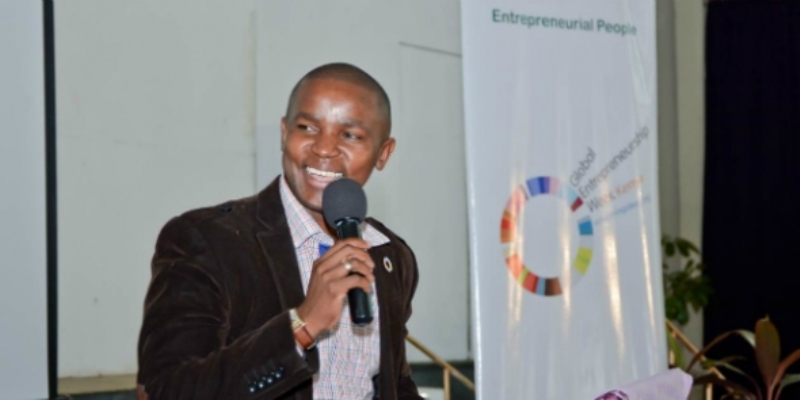Why is Global Entrepreneurship Week important – overall and to Kenya specifically?
Junior Achievement first got involved with GEW in 2008. One of the critical pillars of our programs is the promotion of entrepreneurship culture especially among young people and involvement in GEW was a perfect fit. The alignment of purpose between Junior Achievement Kenya and GEW provided a platform to continue to grow and expand the drive of entrepreneurship in the country.
GEW is important because it provides an opportunity every year where all sectors; that is, the private sector, public sector and social sector, to come together to inspire, motivate and support people around the country. It encourages people to embrace the spirit of entrepreneurship as a key ingredient in driving Kenya’s economic growth towards realizing the Kenya Vision 2030.
Through GEW, we have been able to map out and develop the entrepreneurial ecosystem within Kenya that is important in sparking and nurturing emerging entrepreneurs. GEW provides a unique opportunity to seek and pursue continued engagement with all stakeholders in the development of entrepreneurship culture.
What makes your GEW campaign unique?
GEW Kenya engages various partners who run different events that are aimed at promoting and developing entrepreneurship. What makes our campaign unique is the focus on the promotion of the entrepreneurship culture among Kenyan youth, especially at-risk youth.
For example, we have successfully run SlumFest – an event aimed at promoting the entrepreneurship among youth in Kenyan slums and recently we launched the National Innovation Challenge, aimed at unlocking youth innovation and creativity.
How would you characterize the entrepreneurial environment in Kenya?
Of late, the entrepreneurial environment has improved considerably in Kenya. Most notably, progress has been made in supporting emerging entrepreneurs and facilitating success.
One thing I would change however is the access to affordable credit by youth entrepreneurs and startups. Products being offered by the financial sector are still prohibitive and are not responsive to the needs and requirements of young people.
What methods are you using to encourage entrepreneurship? What have been most effective and popular?
In partnership with the Ministry of Education, Science and Technology and the private sector, we have been implementing hands-on experiential entrepreneurship programs that are aimed at equipping young people with critical entrepreneurship and financial literacy skills.
The program is currently being implemented in 300 secondary schools nationwide reaching at least 24,000 students directly. The program is being scaled up to at least 1,000 secondary schools this year while leveraging technology to support the classroom delivery.
This popular program is modeled around a national competition that starts at the local level and aims to celebrate the most outstanding student-led enterprise. Over the years, the program graduated successful entrepreneurs and employers who are contributing to the Kenya economy.
Additionally, Junior Achievement Kenya has just commissioned a study on entrepreneurship with a focus on which teaching approach is best in the development of an entrepreneurship culture.
What are the key differences in entrepreneurship in a developed nation and entrepreneurship in a developing country?
In developed nations, the entrepreneurship ecosystem tends to be more sophisticated, while that of a developing nation is still in its infancy. Given that entrepreneurship is still growing in developing nations, there is an opportunity for them to leap frog by learning from developed nations’ experiences.
Of course, there is still room for government in developing the appropriate policy framework that supports youth and women entrepreneurs as well as the private sector, especially the stakeholders in the financial sector space to develop innovative products that can support and drive entrepreneurship.
The government has made efforts to ensure that the information on the topic of business is available to everyone in the ecosystem. Most recently, this has been done through the Huduma Centers that serve as a central tool for information and registration.
However, there is still an opportunity for government to coordinate and provide more relevant support especially to youth and women entrepreneurs. This can be done through appropriate training and seminars that can build their capability on how to do business with government.
Which public sector effort has had the most success at unleashing entrepreneurship?
There are a number of efforts that have been fairly successful in unlocking entrepreneurship. Beyond the creation and expansion of funds such as the Youth Enterprise Fund, Women Enterprise Fund and the Uwezo Fund, the Government reserved at least 30 percent of its procurement for youth, women and persons with disability as a way to promote business between government, youth and women.
Further, through the Micro Small and Enterprise Authority, the public sector has provided infrastructure that allows for dialogue and engagement between entrepreneurs and the government. Currently, the government is working towards special economic and free trade zones.
How has GEW grown in Kenya? What are you doing to build on its momentum?
Since 2008 when we held our inaugural GEW with one partner, we have grown to work with more than 50 partners each year and engage more than 30,000 participants.
We have since been recognized as a Kenya Vision 2030 partner as a leader in the promotion of the entrepreneurship culture in the country. The Kenya Vision 2030 which is the county’s development blueprint recognizes the significant role of entrepreneurship in driving the development of both Kenya and the region.

